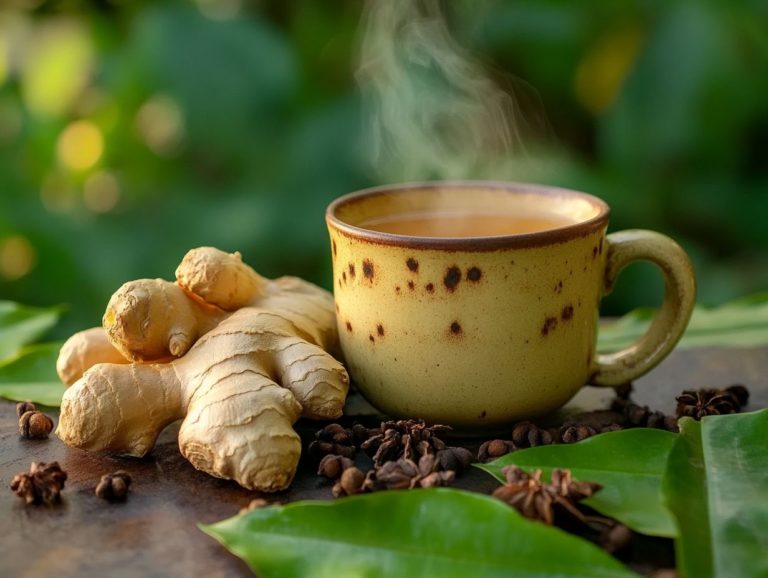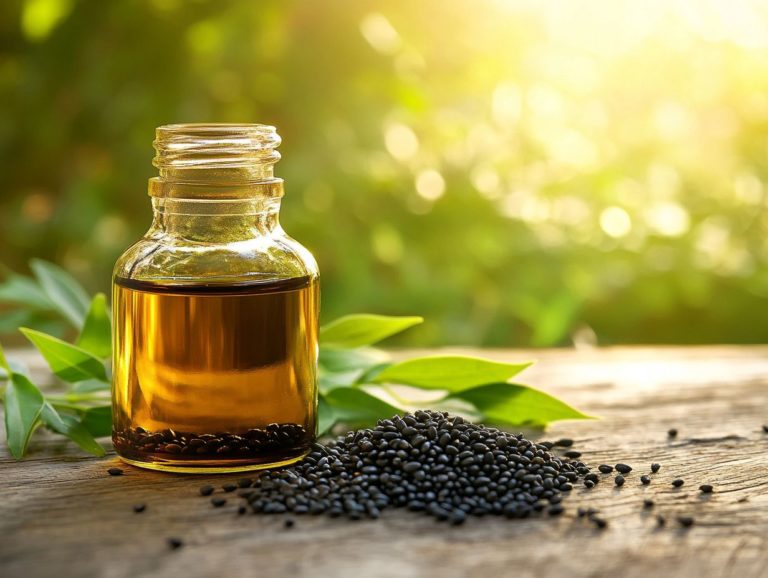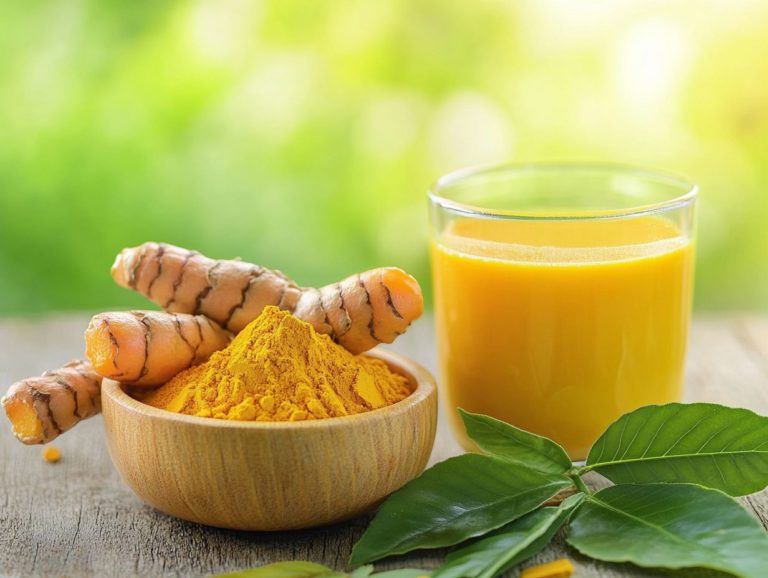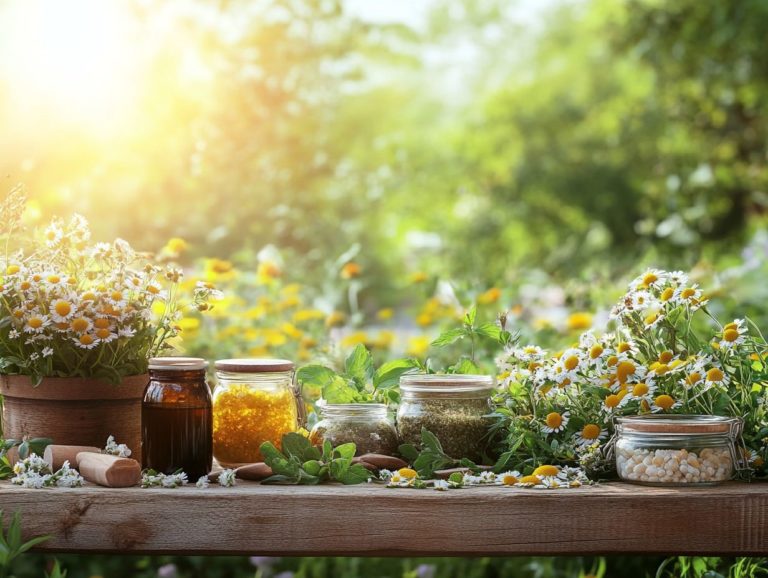Lavender: Uses and Benefits for Health and Wellness
Discover the wonders of lavender! This lovely plant offers not just a calming scent, but also a host of health benefits for your body and mind.
With deep roots in history, lavender is a cherished herb in holistic health. We ll explore its background, health benefits, and practical uses from topical treatments to the art of aromatherapy and cooking with lavender.
You ll also learn essential safety precautions, including the use of lavender essential oil, ensuring you can embrace the benefits of lavender with confidence. Immerse yourself in this journey and discover how this extraordinary herb can elevate your well-being!
Contents
Key Takeaways:
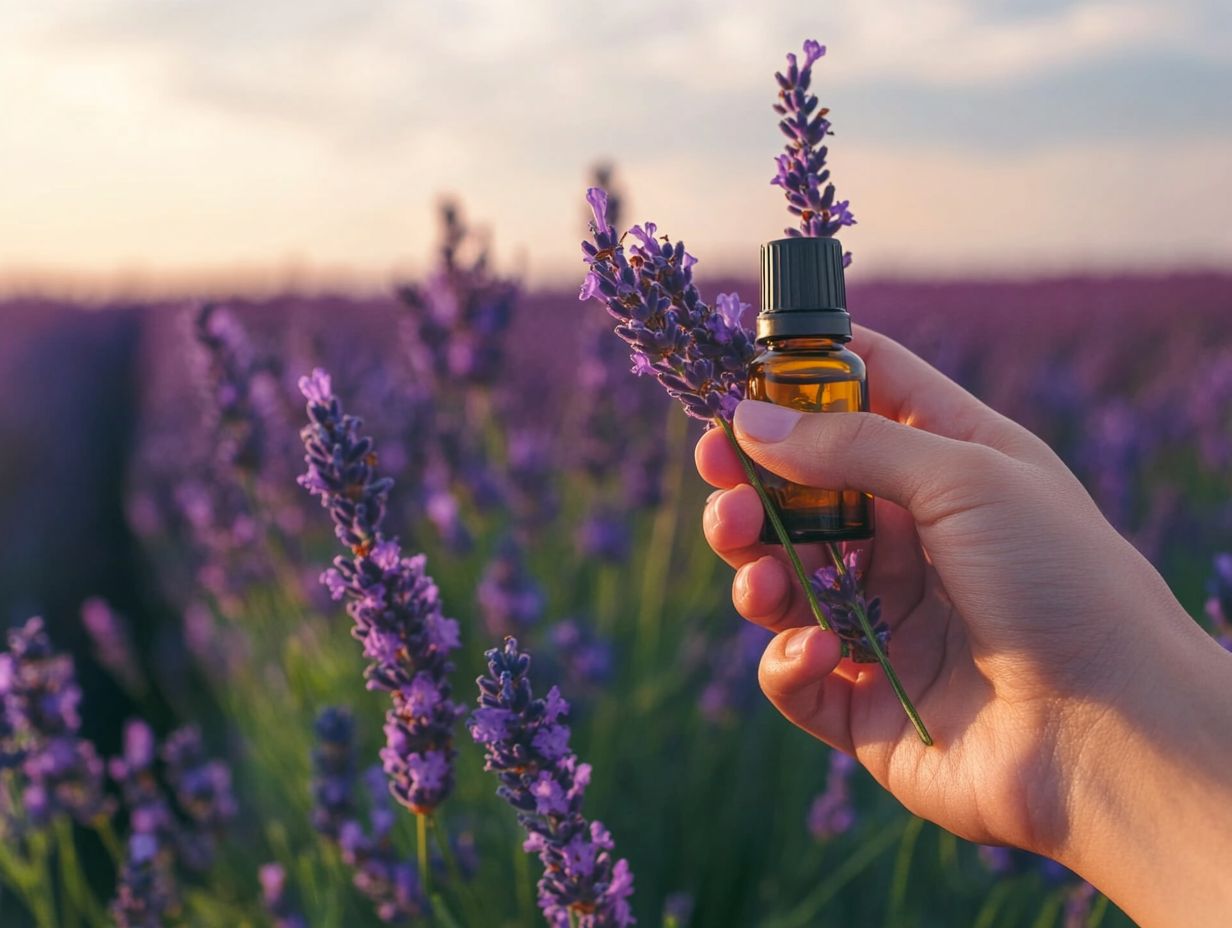
- Lavender has been used for centuries for its medicinal and therapeutic properties, including its calming effects and mood-boosting qualities.
- It can improve physical health by reducing inflammation and pain, promoting relaxation, and enhancing mental health by alleviating anxiety and stress.
- Lavender can be used topically, through aromatherapy, and even ingested as lavender tea. However, precautions should be taken to avoid possible side effects and interactions, especially for those on blood pressure medications.
What is Lavender?
Lavender, known scientifically as Lavandula, is a flowering plant known for its fragrant oil, which offers an impressive array of health benefits. This versatile herb is a staple in aromatherapy and different herbal treatments, prized for its calming effects on both mind and body. If you re on a quest for holistic wellness, lavender is an excellent choice due to its anti-inflammatory properties.
It also improves the quality of sleep and has remarkable medicinal properties that help alleviate anxiety and foster relaxation. The essential oils extracted from lavender contain beneficial compounds that contribute to its soothing aroma and therapeutic effects.
With over 45 species, including the well-known Lavandula angustifolia and Lavandula latifolia, lavender presents a delightful variety of aromas and uses. In skincare, lavender acts as a gentle moisturizer and natural antiseptic, perfect for treating minor wounds and blemishes, making it a staple in natural treatments and health supplements.
Its popularity in herbal medicine is on the rise, as practitioners frequently recommend it for its anti-inflammatory and stress-relieving properties. When used in aromatherapy, lavender helps create calming environments, solidifying its status as a preferred natural remedy. From essential oils to infused lotions, this cherished herb remains an integral part of natural wellness routines.
History and Cultural Significance
The history of lavender takes you back to ancient civilizations, where it was revered not just for its captivating fragrance but also for its remarkable medicinal properties. It played a vital role in various cultural practices.
From the Egyptians, who incorporated it into embalming and cosmetics, to the Romans, who relished it in their baths for relaxation, lavender has been a cherished herb across diverse cultures. It is often included in herbs de Provence.
In medieval times, it served as a protective charm against plagues and a purifier of the air, highlighting its multifaceted significance and its use in herbal medicine.
Today, lavender still holds a place of honor, particularly in regions like Provence and Italy, where it shines in culinary applications and as a prominent ingredient in herbal remedies.
Origins and Traditional Uses
The origins of lavender trace back to the sun-kissed Mediterranean region, where it has been cherished for thousands of years, primarily for its captivating aroma and remarkable health benefits, including its use as a mood booster in herbal medicine. Lavender has a storied history in herbal remedies, addressing a range of issues from anxiety and depression to improving sleep quality with lavender extract and lavender tea.
Its essential oil is a staple in herbal medicine, often featured in calming teas and topical applications designed to relieve stress and enhance overall wellness, frequently recommended by herbalists. The therapeutic properties of lavender, including its anti-inflammatory effects that reduce swelling and pain, have made it a favorite among herbalists and health practitioners alike.
From the sun-drenched fields of Provence to the rolling hills of Italy, this resilient plant flourishes in various climates, craving well-drained soil and abundant sunlight, which are essential for cultivating high-quality lavender. Cultivating lavender requires a touch of artistry; careful hand harvesting preserves its delicate flowers, which are then dried and stored to capture their potent oils, ensuring the maximum benefit of its flavonoids and healing properties.
In traditional medicine, lavender tea shines as a soothing herbal remedy, known for its ability to alleviate digestive issues, migraines, and even enhance sleep quality. Infused oils and balms harness lavender s antiseptic qualities, making it a key ingredient in natural home remedies for a variety of skin irritations, often suggested by health practitioners for its anti-inflammatory properties.
With the growing embrace of holistic healing, the enduring popularity of lavender stands as a testament to its versatility, particularly as a natural treatment for various ailments.
Benefits of Lavender for Health
Lavender stands out as a remarkable herb, renowned for its many health benefits, securing its place as a favored remedy in both traditional and contemporary herbal medicine.
The essential oil derived from lavender serves as a powerful ally against various health issues, particularly anxiety disorders and depression. It functions as a natural mood enhancer and promotes a profound sense of relaxation. Research indicates that lavender can significantly improve sleep quality and reduce stress, offering a restorative effect that is vital for mental well-being.
Lavender also benefits physical health, with its anti-inflammatory benefits supporting skincare and overall wellness, particularly within the realm of health supplements.
Physical Health Benefits
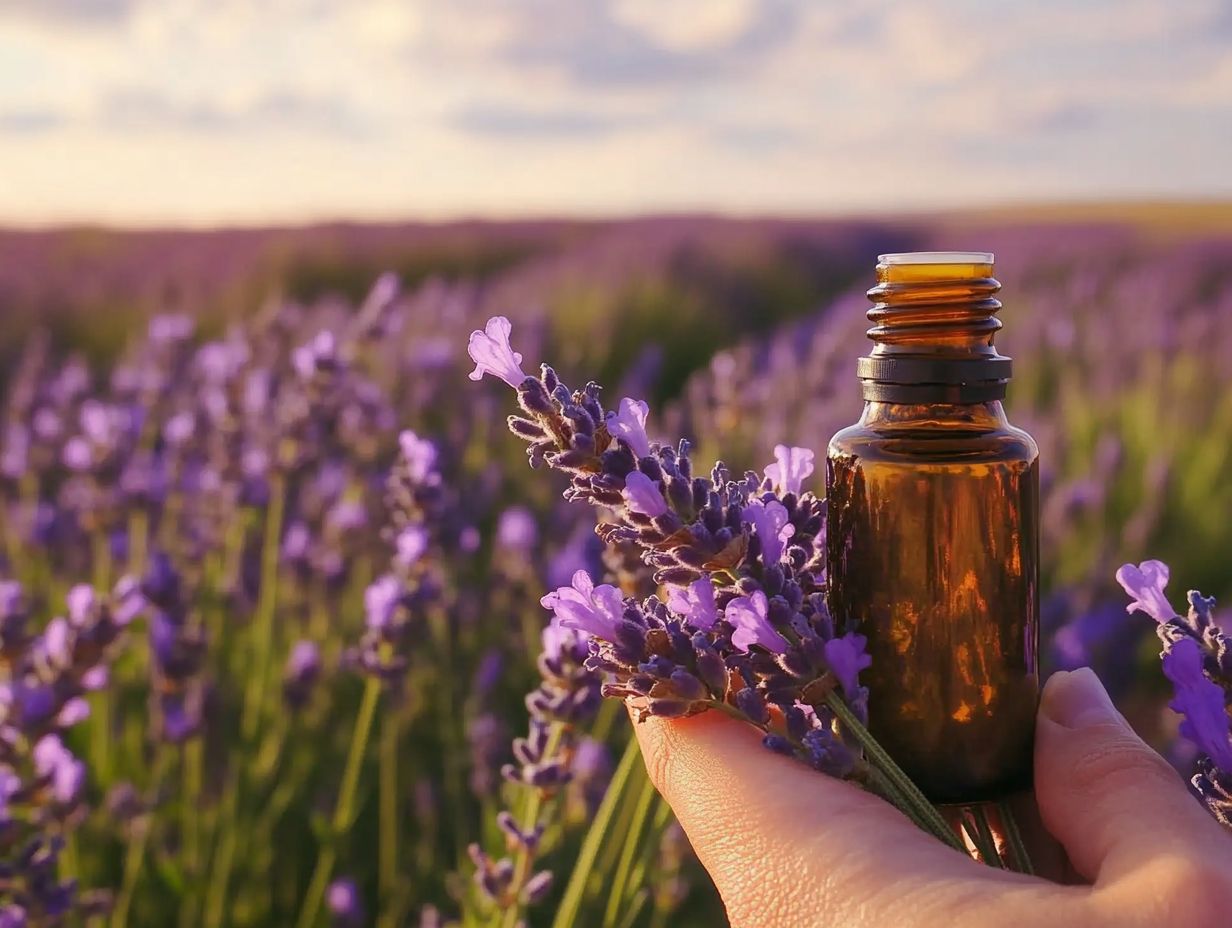
Lavender presents a wealth of physical health benefits, largely due to its remarkable anti-inflammatory properties, versatility in skincare, and its use as a natural treatment for various conditions. The essential oil derived from lavender is loaded with compounds like rosmarinic acid, camphor, and linalool, which contribute to its therapeutic effects, making it an effective remedy for various skin conditions. Lavender oil soothes skin irritations, diminishes redness, and promotes healing, which is why it s a go-to choice in both cosmetics and health supplements, especially for those with chronic health issues. Plus, its calming aroma supports your overall wellness.
Recent studies have underscored lavender oil’s effectiveness for specific skin issues like eczema and acne, highlighting its antimicrobial properties. For instance, a randomized controlled trial revealed that applying diluted lavender oil topically significantly alleviated symptoms of eczema, including itching and inflammation, making it a recommended choice among herbalists. Anecdotal evidence suggests that lavender s antimicrobial properties may help prevent acne breakouts by reducing bacteria on the skin, which is supported by studies showing its effectiveness in treating skin conditions.
By incorporating lavender-infused creams or oils into your daily skincare routine, you re not only tapping into its healing potential but also indulging in a sensory experience that nurtures your emotional well-being, particularly as a natural treatment for stress and anxiety. It s a splendid addition for anyone exploring holistic skincare solutions, especially with its calming effects and mood booster qualities.
Discover the power of lavender! Try lavender-infused products today for a natural boost to your wellness!
Mental Health Benefits
The mental health benefits of lavender are truly remarkable! This delightful herb can help alleviate anxiety disorders and enhance sleep quality, especially through lavender essential oil. Numerous studies show how lavender positively influences brain activity, making it an effective natural treatment for various mental health issues.
For instance, a clinical trial revealed that participants who inhaled lavender essential oil saw a significant reduction in anxiety levels. This also contributed to improved sleep quality. Many people report better sleep as well, with lavender effectively reducing insomnia symptoms for those dealing with chronic health issues and anxiety.
Lavender isn’t just about soothing scents; it s linked to lower cortisol levels, often associated with stress. It creates a serene atmosphere that fosters deeper and more restorative sleep. This makes it a favorite among herbalists and health practitioners. People are turning to lavender as a natural way to boost their mental wellness!
Ways to Use Lavender
You can easily incorporate lavender into your daily routine through various methods! Consider topical applications, aromatherapy, or even ingestion by enjoying lavender tea or using it in cooking. Each approach lets you experience lavender’s health-enhancing properties, including its calming effects and mood-boosting abilities.
Applying lavender essential oil to your skin can provide targeted relief for various conditions. Inhaling its soothing aroma during aromatherapy can uplift your mood and alleviate anxiety. Enjoying lavender in formats like tea can improve sleep quality, while using it in culinary creations can enrich your overall wellness!
Topical Applications
Topical applications of lavender stand out as a premier choice for tapping into its health benefits, especially in your skincare routine. You can dilute lavender essential oil and apply it directly to your skin to tackle issues like acne, eczema, and minor burns. Its impressive anti-inflammatory properties make it a staple in health supplements.
The soothing scent elevates your self-care experience, which is essential for overall wellness! With its presence in creams, lotions, and serums, lavender has earned its place as a staple ingredient in natural skincare products. Many herbalists recommend it for its healing properties.
Beyond its calming fragrance, lavender balances sebum production, making it suitable for both oily and dry skin types. When diluted properly, lavender essential oil can soothe irritation, reduce redness, and speed up the healing process for blemishes. Just remember to conduct a patch test before applying it to larger areas to avoid any unwanted reactions!
By incorporating lavender into your daily skincare routine, you ll not only address specific skin concerns but also enhance your overall skin health. Your skin will feel refreshed and rejuvenated!
Aromatherapy
Aromatherapy with lavender gives you an amazing opportunity to enjoy its calming effects and therapeutic properties simply by inhaling its essential oils!
Using tools like diffusers, inhalers, and vaporization techniques helps deepen your connection to this enchanting herb. Research from the University of Maryland shows that inhaling lavender can significantly lower cortisol levels, the hormone tied to stress.
Many individuals find it helpful to place lavender-filled sachets in their pillows to enhance sleep quality. Others seamlessly incorporate lavender essential oil into their meditation routines, as its soothing scent helps center their thoughts and minimize distractions.
These versatile approaches highlight lavender’s effectiveness in fostering tranquility and emotional resilience. Try adding lavender to your routine today and feel the difference!
Ingestion
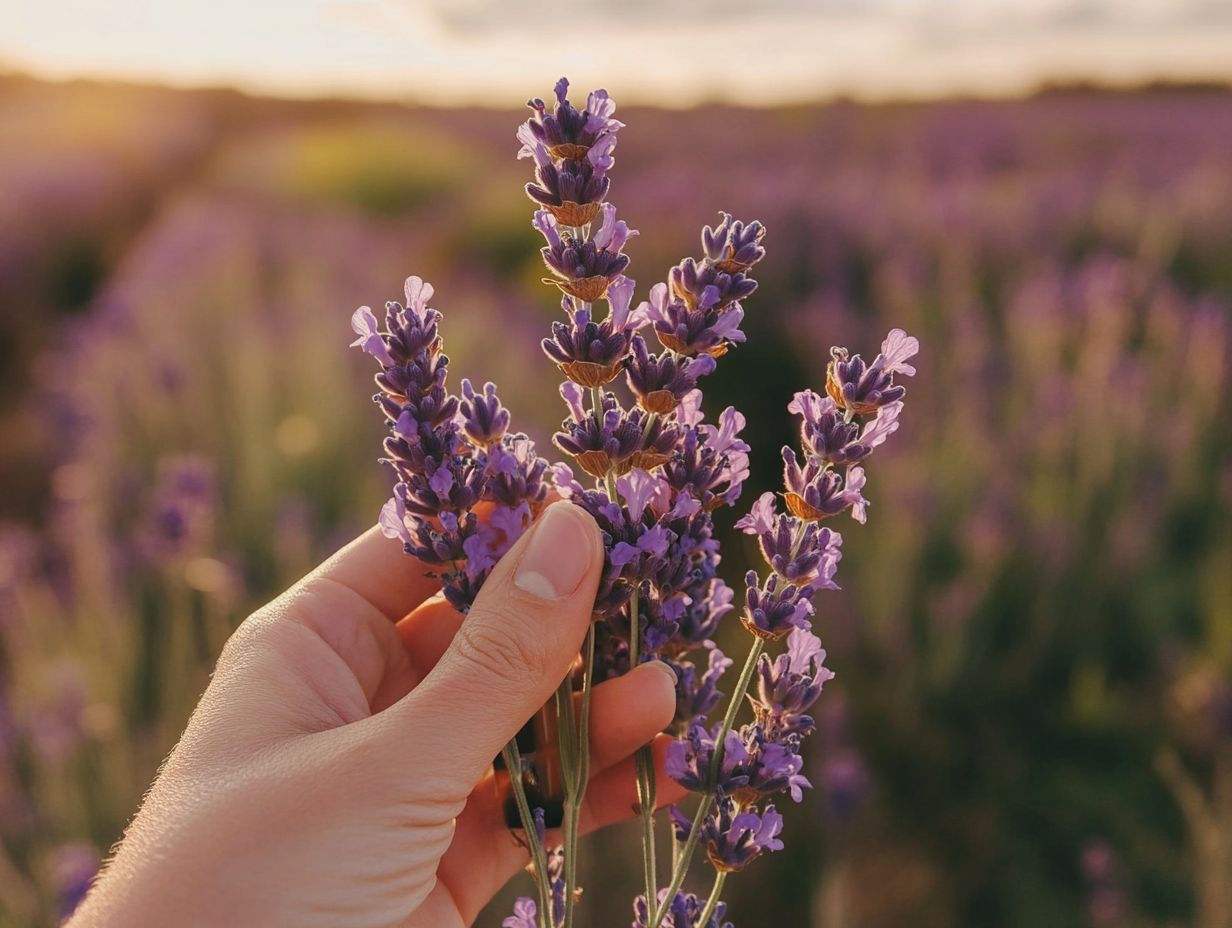
Incorporating lavender into your diet can be delightful and beneficial. From lavender tea to culinary creations, the options are wonderfully diverse.
Cooking with lavender introduces a unique flavor profile that can elevate desserts, savory dishes, and beverages alike. Lavender tea offers a soothing experience that promotes relaxation and aids digestion.
Its health benefits extend beyond just topical and aromatic uses. If you re eager to explore the palatable possibilities of lavender, try adding it to homemade lemonade for a refreshing twist. You ll love the fragrant flavor it brings!
Baking enthusiasts may find joy in creating lavender-infused shortbread cookies. They taste amazing and are packed with antioxidants and potential stress-relief benefits.
In savory dishes, a pinch of lavender can beautifully complement roasted meats or vegetables, creating an aromatic experience that tantalizes the senses.
Mixing lavender with culinary oils can introduce a flavorful element to your dressings or marinades. When you incorporate such dishes into your regular meals, you not only delight your taste buds but also invite the calming properties of this herb into your life.
Have you tried cooking with lavender? Share your favorite lavender recipes in the comments!
Safety and Precautions
While lavender is generally considered safe for most individuals, it s important to keep certain safety precautions and possible side effects in mind. Some people might experience allergic reactions or skin irritation when applying lavender essential oil directly to the skin, so it s wise to conduct a patch test first.
If you have specific health conditions or are pregnant, consult a healthcare provider before using lavender. This is particularly important for concentrated forms like essential oils to prevent any potential interactions.
Possible Side Effects and Interactions
Despite its numerous benefits, lavender may present side effects for some individuals, such as allergic reactions, headaches, or gastrointestinal issues. It’s important to note that lavender can interact with certain medications, particularly those prescribed for anxiety and depression, so exercising caution is essential.
If you are taking medications for anxiety or depression, consult a healthcare professional before incorporating lavender into your routine. By understanding these potential side effects and interactions, you can ensure the safe use of lavender as a health supplement.
Beyond the usual concerns like allergies and digestive discomfort, you might also encounter dizziness or mood changes after exposure to lavender. When combined with sedative medications, the calming effects of lavender could be intensified, leading to excessive drowsiness.
If you’re on anticoagulants, you should take extra care, as lavender has been suggested to enhance the effects of blood-thinning drugs.
Given these complexities, seeking advice from a qualified healthcare provider is a crucial step for personalized guidance. This professional insight can help you navigate your unique health situation safely and effectively while considering thyme: medicinal uses and benefits as a beneficial addition to your wellness regimen.
Summary of Lavender’s Uses and Benefits
Lavender is an incredibly versatile herb that brings a wealth of uses and benefits to the table. From enhancing your sleep quality and easing anxiety to acting as a natural remedy in skincare, it truly does it all.
The calming effects of its essential oils make it a go-to choice in aromatherapy (the use of scents to improve health) and herbal medicine (using plants for healing). Whether you choose to apply it topically, ingest it, or simply inhale its soothing scent, lavender’s medicinal properties play an important part in promoting your overall wellness and mental health.
Its enduring relevance is evident, as lavender remains cherished in various cultural and therapeutic practices around the globe. Lavender also has an enchanting aroma that elevates culinary experiences, infusing unique flavors into dishes and beverages.
Its antiseptic properties make it a sought-after ingredient in natural cleaning products, ensuring that it s not just a pretty face in the herb garden. The adaptability of lavender makes it a household staple, whether you’re indulging in a relaxing bath or refreshing your home with its delightful fragrance.
As more people turn to natural alternatives for health and well-being, lavender’s importance continues to grow, reinforcing that timeless bond between humanity and this beloved plant. Don’t wait! Discover the amazing benefits of lavender today!
Frequently Asked Questions
What are the benefits of using lavender for health and wellness?
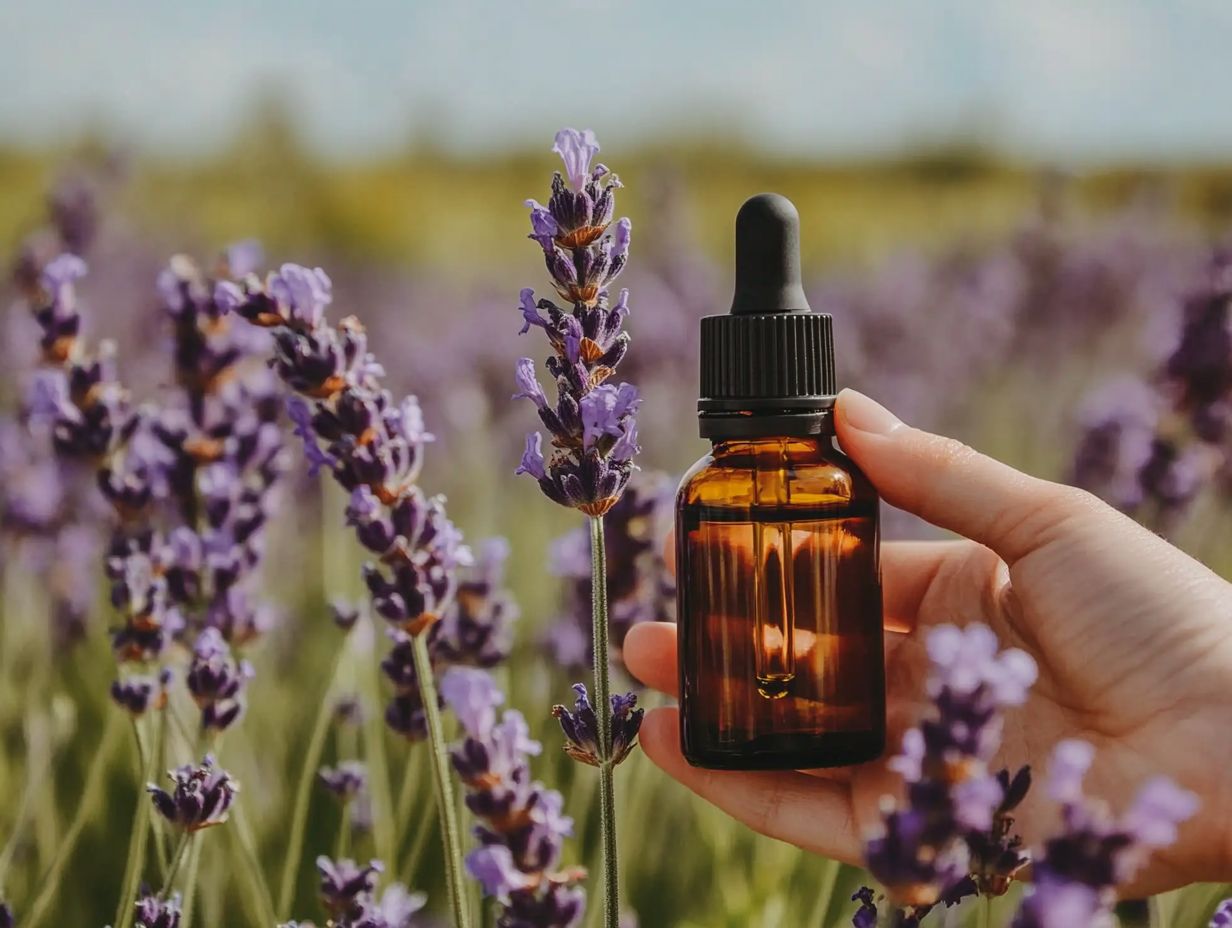
Lavender has been used for centuries for its calming and relaxing properties. It can help reduce stress and anxiety, improve sleep quality, relieve headaches and pain, and promote overall feelings of well-being.
How can I use lavender for its health benefits?
There are several ways to use lavender for its health benefits. You can apply lavender essential oil topically, add it to your bath, use it in aromatherapy, or drink lavender tea. You can also use lavender as a natural remedy for various health issues.
What are the uses of lavender for skin health?
Lavender has anti-inflammatory and antiseptic properties, making it a popular ingredient in skincare products. It can help soothe and heal skin conditions like acne, eczema, and psoriasis. Lavender can also help reduce wrinkles and improve overall skin health and appearance.
Can lavender help with respiratory issues?
Yes, lavender has been used for centuries to help with respiratory issues like coughs, colds, and congestion. Its anti-inflammatory properties can help reduce inflammation in the airways, making it easier to breathe. Inhaling lavender essential oil can also help relieve symptoms of allergies and asthma.
Is lavender safe for everyone to use?
Great news! Most people can enjoy the benefits of lavender safely, but it’s always best to consult with a healthcare professional before using it, especially if you have any underlying health conditions or are pregnant or breastfeeding. It’s also essential to dilute lavender essential oil properly before using it topically to avoid any potential skin irritation.
Can lavender be used for pain relief?
Yes, lavender has analgesic properties, which means it can help relieve pain. It can be used topically for muscle aches and pains, headaches, and menstrual cramps. You can also add a few drops of lavender essential oil to a warm bath to help soothe sore muscles and joints.
For personalized advice and to explore lavender products, consult a healthcare professional.



